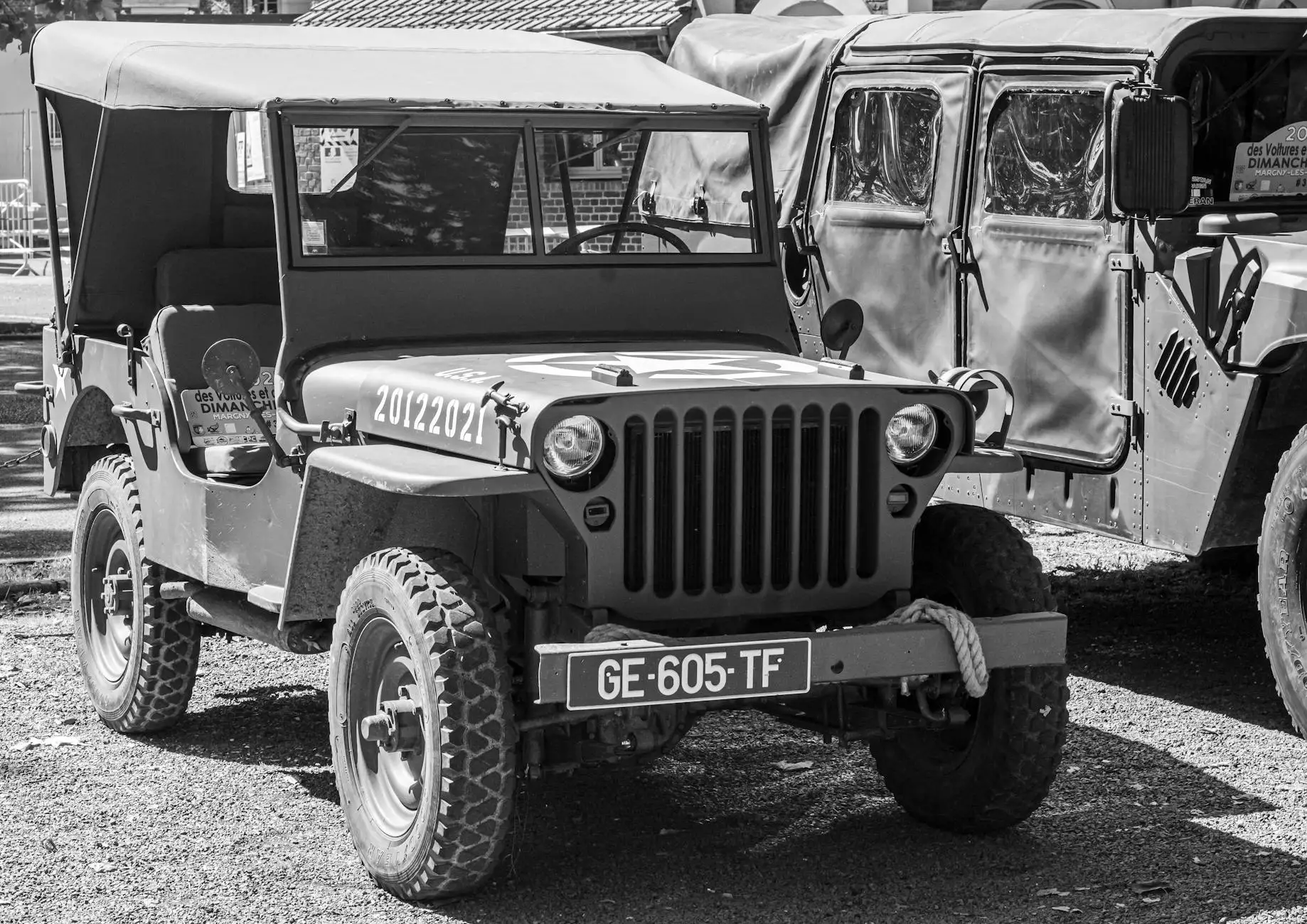The Ultimate Guide to Jeep Wheels and Tires

When it comes to optimizing your Jeep for performance and style, the right wheels and tires can make a world of difference. Whether you’re an off-road enthusiast or simply looking to enhance your daily drive, understanding the nuances of Jeep wheels and tires is essential. In this detailed guide, we will explore everything you need to know about making the best choices for your Jeep, maximizing its capabilities, and ensuring it turns heads on and off the road.
Understanding Jeep Wheels and Tires
Jeep vehicles, known for their ruggedness and off-road capabilities, require specialized wheels and tires that can handle a variety of terrains. Let’s delve into the different types and factors to consider when selecting the best options for your Jeep.
Why Are Wheels and Tires Important?
The wheels and tires of your Jeep are not just about aesthetics; they play a critical role in performance, safety, and comfort. Here are some key reasons why these components matter:
- Traction: Quality tires ensure better grip, essential for off-road and wet conditions.
- Stability: The right wheels prevent wobbling and maintain vehicle stability.
- Handling: Suitable tires improve steering response and overall handling.
- Durability: Investing in high-quality wheels and tires means they’ll last longer, saving you money in the long run.
Types of Jeep Wheels
Jeep wheels come in various sizes, materials, and designs. Here’s a breakdown of the most common types:
1. Steel Wheels
Steel wheels are durable and can withstand rugged conditions, making them a popular choice for off-road adventures. They are typically less expensive and can be easily repaired if damaged.
2. Alloy Wheels
Alloy wheels are lighter than steel wheels and often come in attractive designs. They provide better performance and better heat dissipation, making them a favored choice for many Jeep enthusiasts.
3. Beadlock Wheels
Ideal for serious off-roaders, beadlock wheels secure the tire bead in place, preventing tire slippage during extreme conditions. They’re perfect for low-pressure tire applications.
Choosing the Right Tires for Your Jeep
The right tires can significantly enhance your Jeep's performance. Here are key factors to consider when choosing tires.
Tire Types
- All-Terrain Tires: Versatile and capable of handling a variety of surfaces, making them suitable for mixed use.
- Mud-Terrain Tires: Best for off-roading in muddy or soft surfaces, these tires provide excellent grip in loose conditions.
- Highway Tires: Designed primarily for on-road use, these tires offer a smooth ride and good fuel efficiency.
Tire Size
The size of your tires significantly influences your Jeep's performance. Always refer to your owner's manual for recommended sizes. Common sizes for Jeep tires include 31-inch, 33-inch, and larger tires for lifted Jeeps.
Load Rating
The load rating indicates the maximum weight a tire can support. Ensure the tires you choose can handle the weight of your vehicle and any additional load you might carry during adventures.
Popular Jeep Wheels and Tires Combinations
Selecting the right combination of wheels and tires is crucial for enhancing your Jeep's functionality. Here are some popular combinations to consider:
- Jeep Wrangler: 33-inch Mud-Terrain tires on 17-inch alloy wheels for optimal off-road performance.
- Jeep Cherokee: 31-inch All-Terrain tires on 16-inch steel wheels for a blend of performance and durability.
- Jeep Gladiator: 35-inch All-Terrain tires on 18-inch beadlock wheels for maximum traction and stability in rugged terrain.
Maintenance Tips for Wheels and Tires
Regular maintenance is key to extending the lifespan of your wheels and tires. Here are essential tips to ensure optimal performance:
1. Regular Rotation
Rotating your tires every 5,000 to 7,500 miles ensures even wear and prolongs their life. Proper rotation also enhances handling and traction.
2. Proper Inflation
Maintaining the correct tire pressure improves fuel efficiency, handling, and overall tire life. Regularly check your tire pressure, especially before long trips or off-road adventures.
3. Routine Inspections
Inspect your tires regularly for signs of wear, damage, or foreign objects lodged in the tread. Look for uneven wear patterns, which could indicate alignment issues.
4. Cleaning
Keeping your wheels clean not only improves aesthetics but also prevents brake dust buildup that can lead to corrosion over time.
Enhancing Performance with Upgrades
Upgrading your Jeep's wheels and tires can significantly improve its performance. Here are some upgrades to consider:
Suspension Lift Kits
Installing a lift kit raises your Jeep, allowing you to fit larger tires and improve ground clearance for off-road adventures.
Wheel Spacers
Wheel spacers can help increase the offset of your wheels, providing a wider stance for improved stability and handling in rough terrains.
Performance Tires
Investing in performance tires designed for specific conditions can dramatically enhance your Jeep's capability, whether you need better traction for mud, snow, or rocky trails.
Conclusion
In summary, choosing the right Jeep wheels and tires is fundamental to unlocking your Jeep's full potential. From understanding the various options available to ensuring proper maintenance, this guide serves as your comprehensive resource. Armed with this knowledge, you can confidently select components that not only improve performance but also enhance the appearance of your vehicle. Whether you’re hitting the trails or cruising the streets, the right wheels and tires will set you apart and elevate your driving experience.
Your Next Steps
To find the perfect wheels and tires for your Jeep, visit Offroad Zone to browse our extensive inventory. Our expert team is ready to assist you in making an informed choice that aligns with your needs and preferences.









